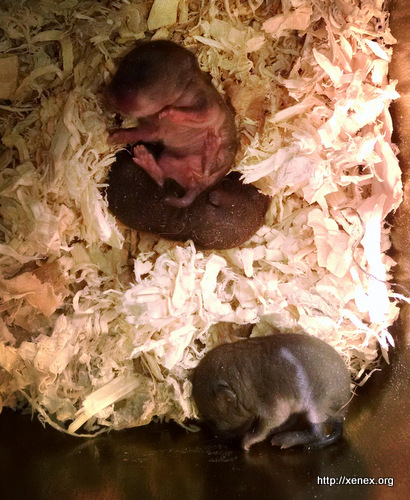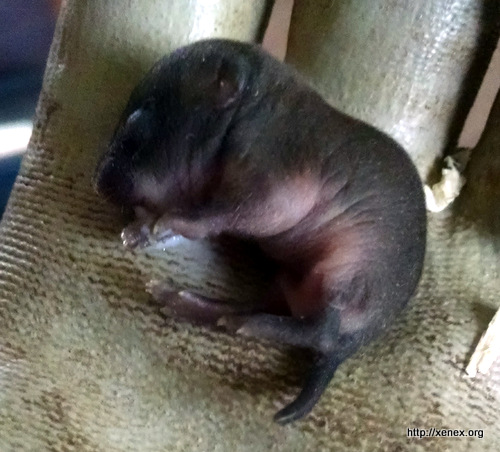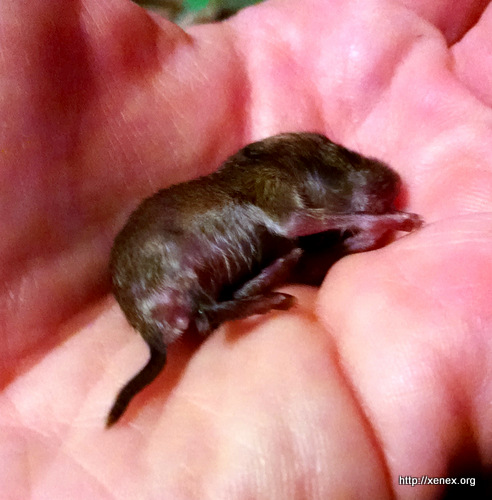
Seeking a Friend for Saturday ««« 2016 »»» To My Recidivist Students
05.15.16
-Anatole France
Until one has loved an animal, a part of one's soul remains unawakened.
Death of the Voles

Amber calls to tell me her coworker moved a mouse nest and babies crawled over his hands, resulting in his terror. She says, "The mother" -- a fiend who had nibbled the heads of the sunflowers in the greenhouse -- "won't be able to find them if I move them, right?" She meant this as a question, but she wants only for me to assure her that it is true.
I tell her I can't know that, but I have my doubt the mother would bother.
She asks if she should leave the babies there or catch them and bring them home. I cannot tell her to leave them to a death by starvation.
Their enclosure is a tea tin, the bottom covered in an inch of wood shavings from the two-by-one foot brick Amber brings with her. She had hidden the mice in a corner at her job in hopes none of her coworkers would notice or disturb them. There may have been more babies, but she could find only three when the day was done.
The moment I see them, I label them jellybeans, upgrading this to fuzzy jellybeans after a day of growth. They are hardly ambulatory, falling onto their sides with every few steps. Their eyes are shut fast, these featureless obligations hanging over our weekend. I don't want to name them because the act of naming implies an attachment I am not ready to give.
These rodents are coddled, warmed by a clay heating pad, fed on puppy milk and Pedialyte to make up for what their birth mother can no longer give. Neither liquid is served cold. Amber microwaves a bowl of water and places the jar within, squeezed into their reluctant mouths. She does this every four hours, waking as needed. By the second night, she is sick and sleepless, but committed to her schedule.
She says that we will release them into the wild - somewhere far from her nursery - when they can make it on their own, but I don't know who she thinks she is fooling.

I come home from a walk Friday and feel dread that I have to feed the babies without Amber. I call her to make certain I am missing no steps, that nothing regrettable will happen to them on my watch. In short order, I abandon the barrier of a towel for the warmth of fur on skin, holding them curled between my thumb and forefinger. One resists the hardness of the eyedropper, which brings me near to panic until I can coerce a few squirts of liquid in his mouth -- as well as some on his fur, which I dab off with a tissue. The others only fight me a second before parting their toothless mouths to receive their meal.
I dip a cotton swab in the hot water and, in miniature of what I have seen people do with newborn kittens, rub its tip in a circle until the animal voids his bowels. In general, I keep excretion far from me, but I feel accomplished that I can nurture them.
I have held babies, I have owned pets, but I have never felt so responsible for something so helpless, knowing we fought against a near certain death had Amber left them. For that, I cannot resist beginning to love them. These are no longer just any rodents. They are our responsibility.
When she returns home, she tells me that she has read up on mice and, based on their short tails and stubby ears, proclaims them likely voles. My only experience with voles was a skeleton I assembled from an owl pellet in sixth grade. I glare down at one for daring to be other than a proper mouse, but he is so off-kilter and top heavy that I cannot help but forgive its racial disadvantage. I rub his wrinkled belly with the tip of my thumb when he topples over again.
I look at a picture of an adult vole and know I have helped dozens out of my apartments.
Amber upgrades them from their tea tin, putting them in the plastic carrying cage that had come with our hermit crabs. It would be cramped if they didn't spend most of their time nestled together in a clump in the shavings.
We stop at the pet store the next day. Amber fantasizes of the toys on which the three with cut their teeth, buying a pack containing a few wooden beads, a loofa slice, and a rope ball. I eagerly imagine them gnawing these into dust.
Amber revives her talk of getting a degree so that she can be a vet tech, a conversation that comes up every few months. "There is a certificate to be a wildlife rehabilitator," she says, excited despite herself.
"I'm not sure we could handle regular infusions of sick and needy animals."
That night, I am seated beside Amber, getting ready for bed while she feeds them, when I hear the smallest gasp from her. She whispers out that the vole is not breathing. I don't know what to do that isn't useless. His body is far too small for my hands. Still, I press on his overripe stomach, feeling the fragility of its ribs. Amber attempts rescue breaths, this tragicomic gesture of her lips engulfing him. "I'm so stupid," she says. "I gave him too much milk. He drowned."
"You said it yourself: ninety percent of baby voles die."
We obtain a trowel from Amber's car, one that has dug for countless plants. She will relinquish neither shovel nor the departed, jabbing into the ground as rain leaks from the sky. The blade of the trowel dings off rocks in the hole we chose on the edge of the woods, but she only groans and pushes on.
I feel a part of some cosmic script - tiny corpse, spitting rain, moonless night, overwhelmed woman -- and unable to buck my part. I almost offer to say a few words, but what do I have to say? I've known this creature only a hair over twenty-four hours. His death is heartbreak to me, a lamentable act whose solution I didn't know.
Amber hesitates placing him in the ground. She pushes his rigid limps. "I thought... For a second, I thought he got soft again." She places him gently in his grave. "I don't want to bury him alive."
"We aren't."
She pushes some dirt over him and says all the eulogy we can give him: "I'm sorry."
For a minute, we stand sobbing into one another, the midnight rain mixing with our tears.
We go back inside and get ready for bed. I hold her close and we cry anew. She blames herself and I am not ready to absolve her of responsibility, though I know it isn't her fault and there was little that we could have done. I want this to be someone's mistake because then I can be other than sad, though I cannot hold this tiny death against someone more distraught and with better cause than me.
They don't have personalities yet, though Amber assures me they will soon. She tells me that voles will even come when called, once they have a few months in them. Nothing yet distinguished one from the other but that one might be longer or maybe fonder of stretching. Once he dies, we are left with twins.
When I wake the next morning, letting Amber sleep in to compensate for her four AM feeding, one of the voles is curled atop the shaving while his brother is burrowed close to the heating pad. I poke him with my finger, but he does not move. I cannot stand the idea that he has died, so I leave him for Amber to discover when she gets up.
She sets about preparing the morning feeding for the two. I wait impatiently, almost unable to look up at her. Once she starts squirting the fluid into their mouths, I see that both are alive and wiggling and immediately confess my cowardice.
After their feeding, I cuddle them both in my hands as penance for my doubts, melting at they blindly try to poke their noses through my fingers.
As we drive down to Amber's mother's home with the animals in a cage on Amber's lap, I say tentatively, "I've thought of a name: Voltaire."
"Which one is Voltaire?" she asks, but we don't have to speak it aloud to know the answer: the one who lives. I want her to suggest a name to match mine, feeling silently that the magic of names can shield them from tragedy.
Julie and Rebecca, Amber's mother and sister respectively, do not seem impressed by our acquisition, though they dutifully look on as Amber and I play with them. As I we coo over the voles (and after I try to draw on Amber with a stylus), Julie says she is glad we aren't going to have children.
After a few hours, we notice that one of the voles has climbed above the shavings and is opening his mouth. He gapes, almost like a baby crying without sound. I stick my finger near his mouth, his nascent teeth scraping the ridges of my fingerprint. Amber thinks he is hungry and feeds him, but he grows limp in her hands. Again, she tries to urge him back from the dead. Julie cautions her against putting her lips on the vole's snout, but a fear of germs doesn't dissuade Amber. "Your lungs are so much more powerful than his," Julie says, but they are not enough to pull him back to life.
Rebecca says we need to put the survivor, Voltaire, beside the deceased vole, to let him know what has happened. These are stumbling, blind creatures likely not a week outside the womb. Knowledge of mortality is beyond them, though Amber obliges, urging Voltaire to wake up his brother.
We bury this unnamed baby outside Julie's home, Amber digging a divot into the ground with a flat rock. She whispers out a litany of I'm sorries through her tears, though she directs these to me. Maybe the milk was too hot, she worries, but I had seen her daubing it on her wrist to check the temperature as mothers do on television, as her family assured her no one does in life. I promise her that he was struggling, even if I fondly misinterpreted it as infancy. We hold each other in the chill of this May day, weeping over another of God's creatures that wanted nothing but a parent.
When we return home with the cage containing only one, Amber declares, "We'll have to love this one extra much."
I sit on the floor, letting Voltaire nestle his head between my middle and ring finger. I cry without reservation, stroking his new fur with utter delicacy. I have not cried so much in a long while because I never before understood how much something could depend on me.
Amber leans over me, kissing the top of my head. "Are you crying over the other ones or because he is so small?"
How can she know so exactly?
She soon hears me sobbing in the basement, where I work to turn some of my thoughts into more coherent mourning. I pull her into my lap. "I just thought that, if I could turn their deaths into something beautiful, then they wouldn't have died for nothing."
When I return upstairs half an hour later, I smell the tang of herbal smoke. "Were you doing witchcraft up here?"
She shrugs. "I just want to give Voltaire any chance we can."

Amber wakes with me on Monday, so that I can go to work and she can feed Voltaire. She brings him over, placing him in the valley of her thighs. She prods at him. He doesn't move.
"He seemed lethargic after his last feeding," she says, beginning to cry into my shoulder. "I thought I could keep one of them. After each of the others, I thought we'd still get to have one to raise. I failed them all... I wanted to give your story a happy ending..."
We dress hurriedly, getting the trowel again from her car. She is blurry from her tears, so I lead her close to where his brother was buried thirty hours prior. She stabs a hole in the ground and slips Voltaire into his final resting place. His name didn't do him much good. Our love could not keep a one of them.
When I get to work, to purge myself of some of the emotion I couldn't let myself feel if I were going to get to here on time, I write her: I love you crazy much. This was a hard weekend for us. I am crying at work, of course, but I want you to know that I love you even more than I did Thursday. It is like the voles nibbled out extra space in my heart so I could love them. Since they've left, that space is flooded with love for you.
Amber replies with: I love you so much too. Maybe even more once I get a good night's sleep again. Who knew we'd get so attached in under five days? We're saps, I guess. Well, I am a resin. I miss you and can't wait to cuddle you when you get back home.
I can't hope to convince you that this is other than insanity, mourning so thoroughly week-old garden pests, but I believe any sensible person invests their compassion in the visibly innocent, those whom life has yet to visit with stain.
Soon in Xenology: Art.
last watched: Pleasantville
reading: The Girl Who Raced Fairyland All the Way Home
listening: Regina Spektor
Seeking a Friend for Saturday ««« 2016 »»» To My Recidivist Students
Thomm Quackenbush is an author and teacher in the Hudson Valley. He has published four novels in his Night's Dream series (We Shadows, Danse Macabre, Artificial Gods, and Flies to Wanton Boys). He has sold jewelry in Victorian England, confused children as a mad scientist, filed away more books than anyone has ever read, and tried to inspire the learning disabled and gifted. He is capable of crossing one eye, raising one eyebrow, and once accidentally groped a ghost. When not writing, he can be found biking, hiking the Adirondacks, grazing on snacks at art openings, and keeping a straight face when listening to people tell him they are in touch with 164 species of interstellar beings. He likes when you comment.